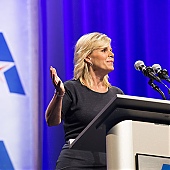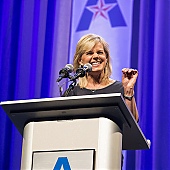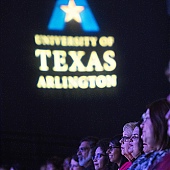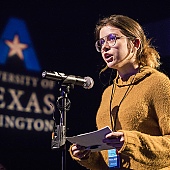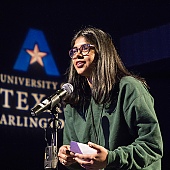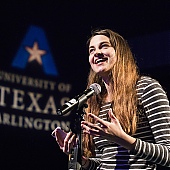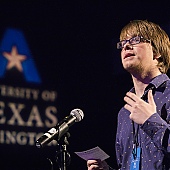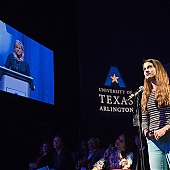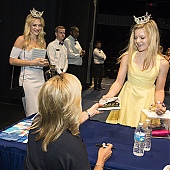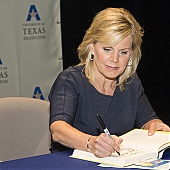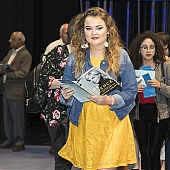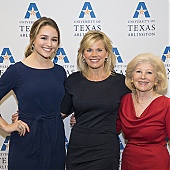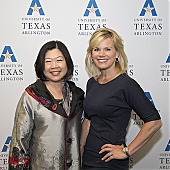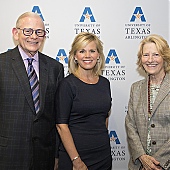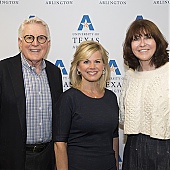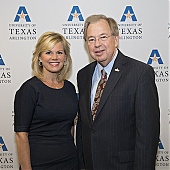SOLDIERING ON
Ashley Seguin used the Post-9/11 GI Bill to earn her nursing degree. She's now an Army nurse in Fort Bragg, N.C.
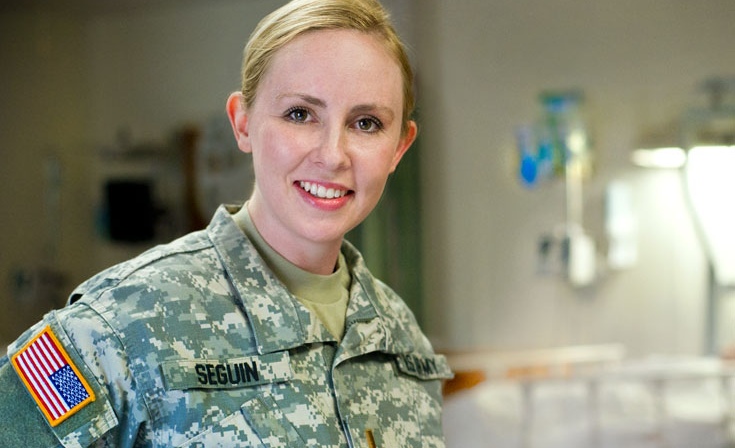
Duty, Honor, College
After life-changing deployments to the Middle East, veterans are returning home eager to fulfill their career dreams. UT Arlington provides an educational foundation to aid the transition for this growing student population.
· Summer 2012 · Comment ·
Ellen Terry almost picked the middle seat that night. She was with a driver and an interpreter in a five-ton U.S. Army vehicle in Baghdad, transporting Iraqi soldiers to the base following a joint mission. A flash pierced the darkness and a loud boom rang out. Shrapnel from a roadside bomb hit the interpreter in the head and killed him where he sat—in the middle seat. The explosion blasted glass shards into Terry’s face and drove shrapnel into her shoulder, but she survived. At the last minute, she had taken the seat by the door.
“During an explosion, there is nothing you can humanly do to protect yourself. I almost sat in that seat. I was already sitting in that seat and decided to move,” the 2008 alumna says. “I had to make peace with the fact that I couldn’t control what happened to that guy.”
By the time young military veterans like Terry are sitting in air-conditioned university classrooms, many have lived through situations their classmates will never experience. They’ve dodged bullets on the front lines, tracked terrorists, watched friends die. And they’re ready to move on.
“When you’re out on a mission, you can have the best plan in the world and it changes in an instant—as soon as a bullet is shot or something explodes.”
The number of ex-soldiers pursuing college degrees is on the rise, fueled by programs catering to their needs and generous government benefits. At UT Arlington the Post-9/11 GI Bill and the Hazlewood Act are assisting more than 1,200 veterans and their eligible dependents. The number has more than doubled since the bill passed in 2009. More veterans are likely on campus, but they’re not tracked if they don’t use the benefits.
Nationally, more than 600,000 veterans are expected to use GI benefits this year. The new GI Bill provides full tuition, a monthly housing stipend, up to $1,000 a year for books, and the ability to transfer the benefit to family members. The Hazlewood Act, passed by the Texas Legislature, provides up to 150 hours of exemption from tuition and fees.
UT Arlington offers a benefits office, advisory council, and student organization to provide a welcoming environment where veterans can flourish academically and transition to the workplace.
“Many of those who have served in the armed forces have risked their lives defending our country,” says Michael Moore, senior vice provost and dean of undergraduate studies. “We’re grateful for their service and honored that they’ve chosen UT Arlington. We want to give these veterans every opportunity to succeed as they begin the next phase of their lives.”
HONOR ROLL
Alumna Ellen Terry, who received a Purple Heart, is pursuing a Ph.D. in psychology.
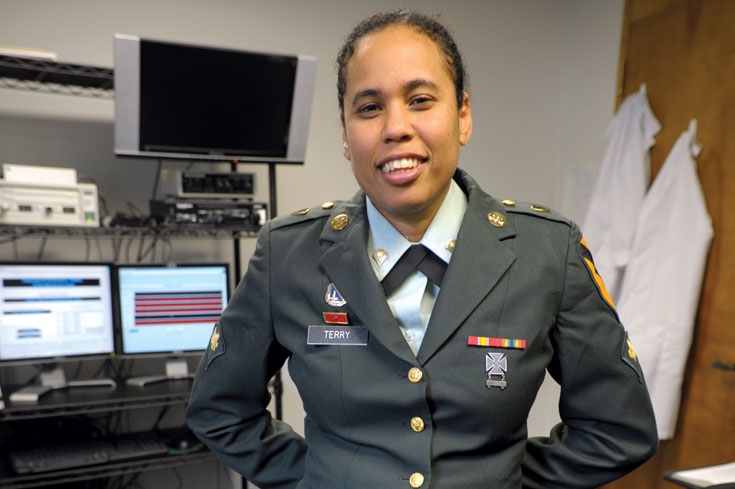
SERVING TO LEARN
Terry, who received a Purple Heart, joined the military in 2001 with education in mind. She deployed to Kuwait for four months in 2003, then to Baghdad in 2004-05. After the explosion, she received 10 days off and served the rest of her deployment in Iraq, journaling extensively to help manage the trauma.
The Belize native, who will be the first in her family to earn an advanced degree, went into the Army because she wanted to get a Ph.D. in psychology. She’s on track to complete her doctorate at the University of Tulsa in 2014.
When her military stint ended, Terry chose UT Arlington to be near big cities without paying big-city prices. She finished her undergraduate work before the Post-9/11 GI Bill was passed, so she used the considerably smaller benefits from the old Montgomery GI Bill.
The promise of a college education also enticed veteran and graduate student Matthew Foster. “I wanted to go to school and didn’t really have any means to pay for it,” says Foster, who grew up in New Braunfels and chose UT Arlington when his wife got a job in Dallas. They live in Grand Prairie.
After graduating in December 2011 with a bachelor’s degree in interdisciplinary studies, Foster is pursuing a master’s degree in public administration, public budgeting, and taxation. He’s also the district director for state Rep. Rodney Anderson, R-District 106. Foster served in the Army from 2003 to 2007 and deployed to Iraq in 2005-06, working mostly on convoy security in Baghdad.
“It’s one of those periods where I went there and I did it and it was a life-changing event and helped shape a lot of the way I view things now,” he says. “When you’re out on a mission, you can have the best plan in the world and it changes in an instant—as soon as a bullet is shot or something explodes. It forces you to be very adaptive.”
As an undergraduate, Foster was active in the University’s Student Veteran Organization. “It gives us just a small little group of friends that automatically have a bond with each other.”
EASING THE TRANSITION
Former Shorthorn editor Sam Morton ’12 deployed to Iraq a few months after graduating from high school. He was among about 600,000 military veterans nationwide to use GI benefits this year.
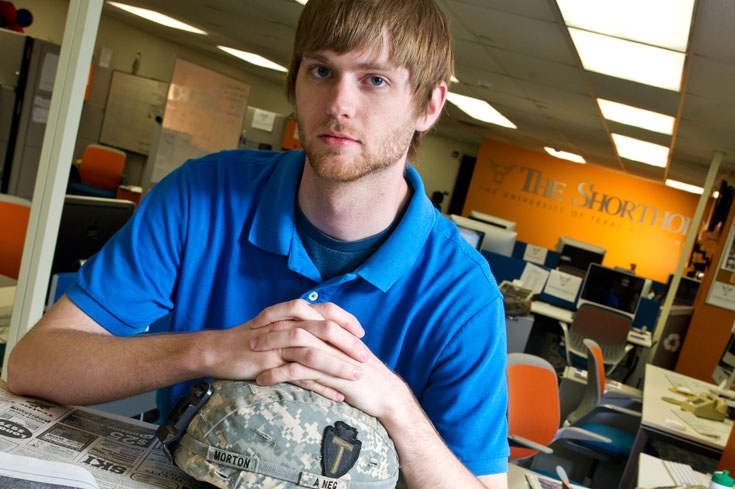
GAINING PERSPECTIVE
Networking with fellow ex-soldiers isn’t for everyone, of course. Sam Morton ’12, an Army National Guard veteran, was glad to exit the military. “I was done with it, tired of it,” says the journalism graduate who served as editor-in-chief of The Shorthorn, UT Arlington’s student newspaper, in spring 2012. He is an editor at Multibriefs in Las Colinas.
Morton never thought he’d go to Iraq when he signed up as a senior at Boswell High School in Saginaw. “The National Guard recruiter says, ‘Free college, you don’t have to go to Iraq. The last time the National Guard deployed was in World War II.’ ”
But there Morton was in boot camp at age 17, a month after he graduated. Six months later in Iraq, a close friend died when a roadside bomb exploded on a convoy.
“It was probably one of the hardest weeks of my life,” Morton says. “After that first deployment, it made me grow up and understand just how trivial a lot of things in America are. A lot of the problems and drama are not that big a deal in the grand scheme of things.”
Morton deployed a second time and came home in 2009. He applied to UT Arlington because it was his mother’s alma mater and because he liked the campus after taking a tour. After an earlier experience at a community college, “it felt like an actual college campus,” he says. “I didn’t really look anywhere else.”
Like Morton, Scott Torres also gained a new perspective after serving in Iraq. A veteran of five deployments, the Marine sergeant commanded a platoon of 45 during a 2007 stint north of Baghdad.
“I was there as part of the infantry, actively looking for all the bad guys. There are life-and-death situations when you’re deployed into combat zones, but everything just seems to be more clear as far as what you’re doing in life, what your purpose is, what you’re going to do to live and survive the next week, the next month.”
Torres, a 2005 business graduate who works in the finance industry, says many veterans have a hard time re-entering a society where people worry about buying the latest iPhone or get angry when a driver cuts them off.
“People back here in the states stress out about things that don’t mean anything in the long run,” he says.
Sgt. Scott Torres, a business graduate who works in the finance industry, commanded a platoon of 45 Marines north of Baghdad.
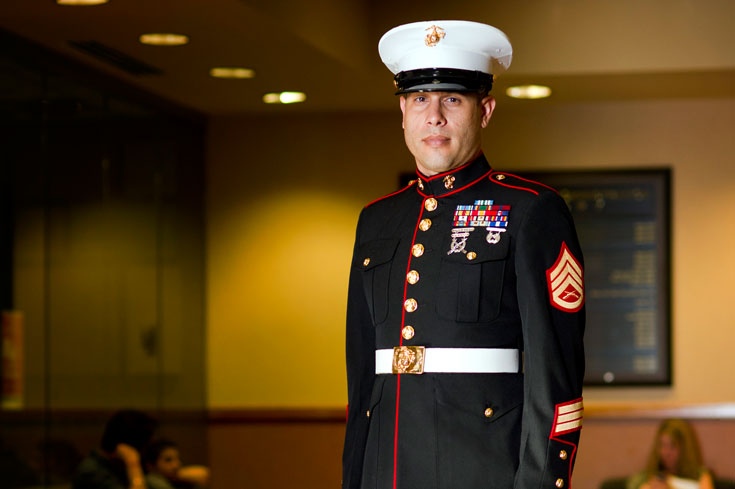
MOVING ON
Helping former soldiers adjust to college life is among the goals of UT Arlington’s Office of Veterans Affairs, a one-stop center for all phases of the veteran educational experience.
“What we’re trying to do here, and what’s happening at a lot of college campuses, is to create a good environment for veterans,” says Anita Perez, the University’s veterans benefits coordinator. “We have a really good student veterans organization, a good little core group that’s trying to bring people together.” To improve services for future students, the University’s Student Veterans Advisory Council has created an online survey.
The transition from combat to classroom was easy for Wade Isham, who graduated this spring with a bachelor’s degree in history. “I was actually ready for it. I did well in all my classes.” He has his sights on becoming a military historian.
From the time he graduated from Kerrville High School, Isham wanted to attend UT Arlington but “didn’t really have the grades or the maturity to come up here.” So he joined the Air Force. In four years of active duty, he did three tours in Iraq, mostly working security at airfields.
In a column he wrote for the Fort Worth Star-Telegram last July 4, he described a convoy through Mosul, Iraq’s second-largest city, to get mail and food for his compound. Such trips may sound routine, but they’re fraught with danger. His sergeant warned the soldiers to watch for snipers and explosives.
“Thoughts of car bombs and ambushes flood my consciousness,” Isham wrote. “The best sight is the Army gates ahead.”
Though she hasn’t been to war, Ashley Seguin says the Post-9/11 GI Bill allowed her to attend UT Arlington without having to work. She enlisted in the Army at age 18 but changed to the National Guard after she married and became pregnant. She came to the University in 2007 and joined ROTC.
“After being here and being part of the ROTC program, I believe it’s one of the best in the country,” says Seguin, who graduated in December 2011 with a bachelor’s degree in nursing. She and her family live in Fort Bragg, N.C., where she’s an Army nurse.
Their military experiences and reasons for attending college differ, but UT Arlington’s veterans share a determination to succeed academically and professionally. Those who spent time fighting in a Third World country gained an appreciation for what they had when they got home.
Sam Morton puts it this way:
“Take it a step at a time. And don’t take what we have in America for granted.”

